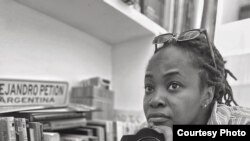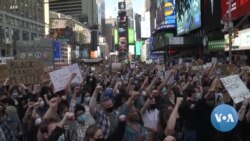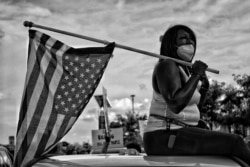An American photojournalist who captured iconic images of what it means to be Black during a pandemic and protests over racial injustice in the U.S. is being honored with an award.
Vanessa Charlot, an Army veteran from Miami who was raised by Haitian parents, is one of the International Women's Media Foundation's Courage in Journalism awardees.
The freelancer's work, which centers on race and identity, stood out in a year when the U.S. was grappling with the pandemic and calls for justice for Black Americans after George Floyd was murdered in police custody.
Charlot told VOA that her own identity as an Army veteran and mother had helped drive her work as she photographed protests in St. Louis, Missouri.
"I wanted people to be curious about what would make a Black mother in the middle of a global pandemic hit the streets," Charlot said. The year 2020 meant dealing with "two existential threats," she said: police brutality and the coronavirus.
"In spite of all this, Black people in America — and I speak very broadly because not everyone was in the streets — but for the most part, we understood that irrespective of what was going on, this was a movement for justice and for liberation."
One of the images that stood out most for Charlot was "The American Patriot," which depicts a woman holding an upside-down flag as she sits on the hood of a car and watches a line of police officers out of sight.
"It's very haunting image," Charlot said, adding that the symbolism of the flag spoke to her as a veteran.
"The upside-down flag means that you are at war in your own country. So, personally, for me to know that I have served the country but now I'm at war in that country for ideas that I went and fought for, there's a very uncomfortable irony about that," Charlot said. "Secondly, aesthetically speaking, the darkness of her skin stands out to me because I think that the Black woman is undeniably the pillar of all (Black) communities."
The IWMF said the work of Charlot and the other 2021 awardees, including two female journalists jailed in Belarus, played an important role "at a time when surges of nationalism, social unrest, gendered attacks, and the oppression of a free press remain at alarming highs worldwide."
The winners this year are unique because they all covered news in their home country, IWMF's executive director, Elisa Lees Muñoz, told VOA. "(Charlot) has been covering social justice movements and is being attacked and harassed by onlookers and everyday citizens."
An unprecedented number of journalists were attacked, detained or harassed during protests in the U.S., according to the U.S. Press Freedom Tracker, which documented over 440 incidents against journalists in 2020. The tracker is a collective of several media rights organizations, including the Freedom of the Press Foundation.
In Charlot's case, she said she had been harassed and threatened several times while covering events in St. Louis, as well as being teargassed.
She recalled one occasion when a white man in a pickup truck "was spewing racial slurs at me and attempting to drive through the crowd."
The extra risk for photojournalists was a focus this month for the One Free Press Coalition, ahead of World Photography Day on August 19. This month, the coalition featured 10 cases of visual journalists who had been attacked, kidnapped or even killed while working.
The U.S. Agency for Global Media, which oversees VOA, is a member of the coalition.
Charlot, whose work has appeared in publications including The Atlantic, The New York Times and O, The Oprah Magazine, says she uses her photography to document the "beautiful complexities of Black life."
"I am particularly interested in having Black people see themselves in the work and have them be the center of their stories, free from an oppressive white gaze," she said.
"History is often told from the position of a victor and not the victim," Charlot said. "So how do we begin to challenge those stories? How do we begin to reshape those stories where Black people, and myself as a Black woman behind the lens, are the ones telling our stories in a very authentic way?"
Muñoz of the IWMF said the annual Courage in Journalism Awards help bring attention and authority to the honorees.
"We hear from our winners how important it is to receive this international recognition, how it offers them a mantle of protection when they're being threatened and attacked," she said, adding that the award also gives them "more authority in their reporting and more standing in their own communities."
Charlot says the award signifies what is possible.
"I'm a Black girl from the streets of Miami. I was raised by Haitian parents. I understand struggles about immigration, about Blackness, about being in low-income neighborhoods — all those things — very personally," Charlot said. "To come from that place and then be celebrated among colleagues, among people that I look up to, is very humbling … and encouraging."
VOA's Press Freedom editor Jessica Jerreat contributed to this report.









